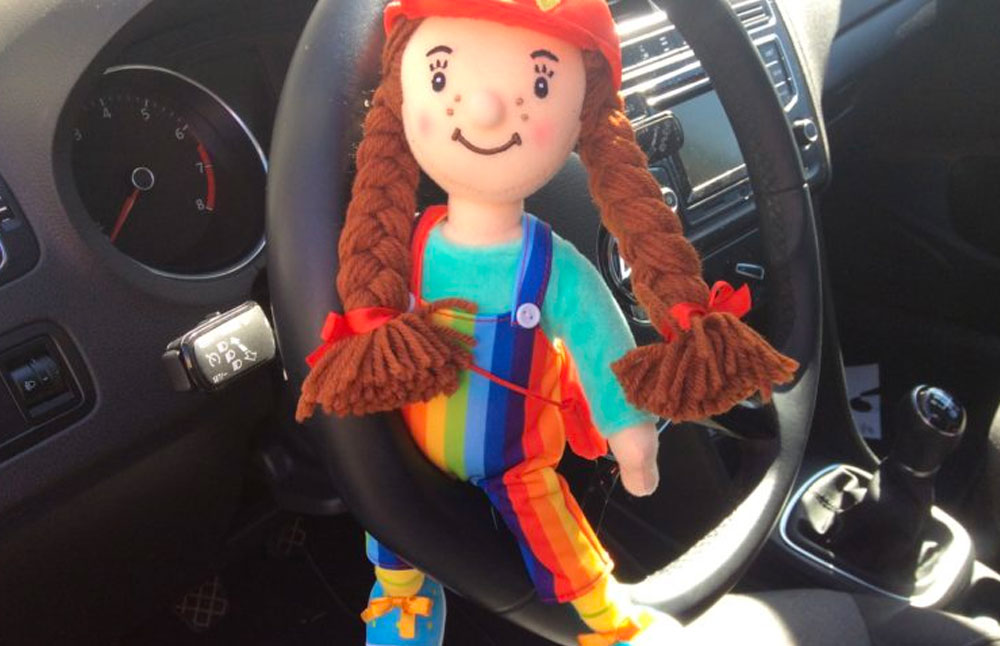Managing behaviour
Today I walked through the nursery to see – as I often do – one young child very proudly wearing his Superstar Medal.
Later I collected my own little granddaughter from her reception class adorned with good behaviour stickers and boasting a very bright certificate for helping the teacher. Even grown-ups welcome a pat on the back for achievement. That’s why I always try to encourage those who work for me and focus on their strengths and not the weaknesses.
We all have them!
I was thinking about rewards generally and decided we needed to design our own rewards chart based on the lovable nursery character – Rianbo – the doll who loves to travel. So that’s a challenge I’m going to put to my nursery nurses next week.
This is Rianbo by the way.
I’m sure most of you know she is my nursery logo and I am developing a series of books based on her travels.
Ok back to the point of this blog.
It’s probably around the age of three years that children grasp the idea that a certain type of behaviour is related to rewards. That feel good factor, knowing there will be a treat or they are working towards a greater goal. The promise of that something special when they have enough markers on their achievement chart.
Yes, children love praise and affirmation and we just love good behaviour, don’t we? Suddenly everyone is happy.
So, what are my suggestions? I know these things are obvious to many but what about all those young parents who are just starting out? Parenting isn’t easy and a little advice from those of us who are more mature never goes amiss. After all we’ve been there and survived it.
Remember that the first 5 years of a child’s life are the most important. They learn what they live, what they see and observe. From an early age they begin to test the parameters. What can they get away with and if we say no and they pester, will we change our mind?
Those of you who would particularly like to see a change in behaviour of the child in your care, one way to view it is a little like joining a slimming club. Don’t expect too much too soon. Small steps to begin with, and unacceptable destructive behaviour can be turned around quite quickly.
Just a few things to think about.
1. Decide whether you are going to have a star chart, coins in a jar or some other kind of reward system. Depending on the age of the child those coins in the jar could really bring positive results as they plan how to spend their rewards. So age appropriate rewards are essential.
2. Set the rules and guidelines that the child is to follow.
3. Make it very clear what the child is working towards.
4. Don’t make the targets overwhelming. Small steps can lead to great achievements.
5. Practice prevention. If you see something is likely to develop divert their attention and hopefully avoid the situation.
6. Always offer choices and make your no means NO!
7. If you struggle with bad behaviour use time out or withdraw privileges.
nb .Personally I believe withdrawal of privileges or confiscation of certain items for a period of time is sufficiently effective. That plus a full explanation of why the behaviour is not acceptable of course – depending on the child’s cognitive development.
So whether it’s time to encourage independence and teach those 8 year olds to take more responsibility and do a few household chores, or modify unacceptable behaviour. Whatever method you use, this is the one I like.
For the older kids;-
A large jar or money box where a fixed amount is deposited on completion of the named tasks.
When full the money can be spent on the child’s chosen treat.
Even more fun if the jar is sealed and covered no-one will know actually how much is in there until it’s full.
For the younger kids;-
A colourful chart on the fridge, working towards completion with colourful stars or a favourite character. When the chart is full it’s treat time.
Design your own or download one from the internet. There’s plenty to choose from.
Have fun and remember…..
Children grow up whilst we’re not looking, and if we train a child well from early years he will not forget.
Good luck.
Anna

